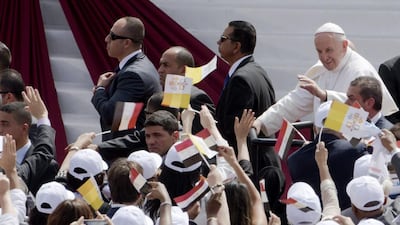CAIRO // Cheering crowds greeted Pope Francis at a Roman Catholic mass in the Air Defence Stadium on the outskirts of the Egyptian capital on Saturday.
Thousands waved flags with Egyptian and Vatican ensigns and released balloons in the Vatican’s yellow and white colours as the pope was driven around the track before his sermon.
“The only fanaticism believers can have is charity,” he said. “Any other fanaticism does not come from God and is not pleasing to Him.”
The pope was continuing his message of peace on the second day of his visit aimed at fostering peace between Muslim and Christian communities.
“Do not be afraid to love everyone, friends and enemies alike, because the strength and treasure of the believer lies in a life of love,” he said.
Pope Francis’ visit, the first by a Pope in more than 17 years, came only three weeks after attacks on Coptic churches killed at least 45 people in the Egyptian cities of Alexandria and Tanta.
Rather than staying away from the churches after the attacks, the incident has encouraged one Coptic Christian to begin attending mass.
“The incident happened during a very holy time for us and you could see it brought our community together,” said Amir Obeid, 38. “Following the attacks the church was full of people.”
The Cairo native said the Pope’s visit and his message were timely and crucial for the country.
“This was very important for Egypt,” Mr Obeid said. “First it showed that the attacks had nothing to do with Islam and secondly it showed what Christianity is really about — loving everyone, including your enemy.”
He said just as any minority in any nation was, to some degree, discriminated against, Christians in Egypt also had to deal with prejudices. But this was not the norm.
“You will find extremists in any religion but it is a matter of statistics — as there are many more Muslims in Egypt there are a greater number of fundamentalists,” Mr Obeid said.
Muslims in Egypt outnumber Christians nine to one, with about nine million Christians who are predominantly Copts.
Mr Obeid said he did not need to read the Quran to know Islam was not a violent religion. “I see it in the way I am treated by my Muslim friends and the community.”
He said the pontiff’s visit had made him proud and showed Pope Francis was a brave man who “practises the Christian doctrine as it should be and is not affected by the politics”.
Prof Philippe Bordeyne, president of the Catholic University of Paris, said the Pope’s decision to visit despite the attacks showed he valued delivering his message more than his own life.
“When you are a religious leader, if you refuse to say the words because you are afraid, how can you ask people to say and do what they believe in with courage?” Prof Bordeyne said.
The Pope’s visit signalled another big step in improving relations between Rome and Cairo, which began to break down more than a decade ago.
In 2006 Pope Benedict XVI angered much of the Muslim world when he quoted a 14th-century Byzantine emperor’s negative comments about Islam.
Egyptian president Abdel Fattah El Sisi began rebuilding relations when he visited the Vatican in 2014 and invited Pope Francis to Egypt.
Relations strengthened further last year when the Grand Imam of Al Azhar, Dr Ahmed Al Tayyeb, accepted the Pope’s invitation to the Vatican.
Religious leaders at Al Azhar on Friday called for the renouncement of religious extremism and countering of hate and violence, at the end of a two-day peace conference held by Al Azhar and the UAE’s Muslim Council of Elders.
After Saturday’s mass, Pope Francis had lunch with Catholic bishops. He then visited St Leo the Great Coptic Catholic Patriarchal Seminary in the suburb of Maadi, where he was joined by priests, nuns and other religious leaders before his 5pm flight back to Rome.
*A correction has been made to this article for accuracy
tsubaihi@thenational.ae

